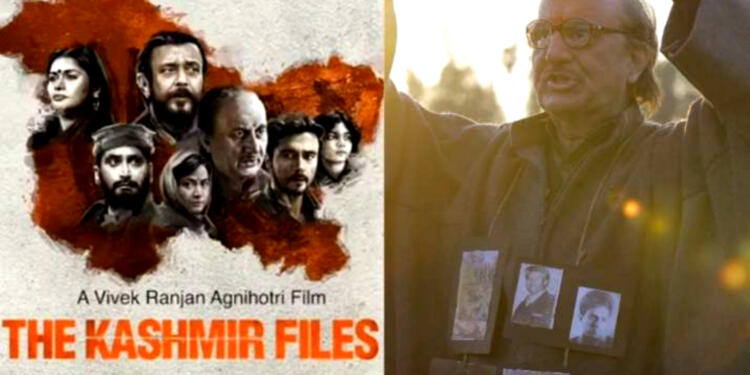The Kashmir Files will turn your stomach upside down. It will make you break down. It will make you feel helpless in a country that is seemingly yours. It will make you realise how you, despite being a Hindu; or a tolerant minority of India – can be exterminated at ease. All it would take for the world to come crashing down for you and your family is a frenzied mob high on religious radicalism, being pushed to violence by the blaring sounds emanating from loudspeakers on certain buildings.
That is what The Kashmir Files does. It is perhaps the first film that does not shy away from showing reality as it was in the Kashmir of 1991 and the years that followed. The film is gory. It is definitely not for the faint-hearted. The film will shake you from within, and as you leave the theatre, there is a high chance you would choke up on your own tears. Vivek Agnihotri’s critically acclaimed film will leave you numb and cold.
Whether it be the Nadimarg massacre near Shopian in Pulwama district, when 24 Hindus were killed by terrorists dressed in army outfits, or the enactment of jihadis feeding a wife rice soaked in her husband’s blood – the film shows it all. Rapes, murders – all indicators of a genocide were shown in the film. The film has certain gory elements, definitely. But that is not even a fraction of what the Kashmiri Pandits actually suffered.
Apart from Anupam Kher and Mithun Chakraborty, an ensemble cast of National Award Winners like Pallavi Joshi, Prakash Belavadi and others makes The Kashmir Files a must-watch. Unlike Vidhu Vinod Chopra’s Shikara, ‘The Kashmir Files’ is a shocking, interesting, and brutally honest film. The movie bravely depicts the true stories of Kashmir Pandits’ genocide. Vivek Agnihotri reportedly contacted innumerable Kashmiri Pandits and their families for their testimonies, and the film is based on their real-life accounts.
The terror situation in the valley along with dreadful rallies and killings has been displayed honestly. Anupam Kher, who is a Kashmiri Pandit, makes everyone teary-eyed when he describes ‘their’ Kashmir. Mithun Chakraborty, through his outstanding performance, shuts up an Islamist sympathiser when he says, “Kashmiri Pandits also went through so much, but they never picked up a gun. Why?”
The film actually goes on to show what kind of genocidal slogans were raised during the slaughter and exodus of Kashmir Pandits from the valley.
“Pakistan se kya rishta? La Ilah-e-Illalah.”
(Islam defines our relationship with Pakistan)
The film unapologetically shows how Kashmiri Hindus were given a clear choice by Islamist terrorists of the valley. Their condition was: ‘Ralive-Tsalive-ya Galive’ (Convert, leave or perish). Therefore, the fundamental issue with the Islamists of Kashmir was that a significant chunk of the population in the valley belonged to the Hindu faith. Hindus were an eyesore for Islamists. The film makes the same abundantly clear.
Read more: Vivek Agnihotri’s ‘The Kashmir files’ is a hit even before it is released
The Kashmir Files also shows how academia in India has been infiltrated by far-left hooligans who lie through their teeth about Kashmir. They openly call for Kashmir’s separation from India, giving it the name of ‘independence’. The film exposes the hypocrisy of such specimens by showing how they remain indifferent to the plight of Kashmiri Pandits, who, unlike Kashmiri Muslims, are actually victims of genocide.
The film needs to be watched by everyone. Even if the film barely scratches the surface of the genocide, it provides insights into previously unknown incidents. The film shows how Kashmiri Pandits suffered and continue to await justice. It shows how ‘modern’ Indians are quick to jump to the defence of Islamists in the valley but maintain an eerie silence on the issues that Kashmiri Pandits face to this very day.
If you have not watched the film yet, make it a point to book the next show for yourself and your family.
